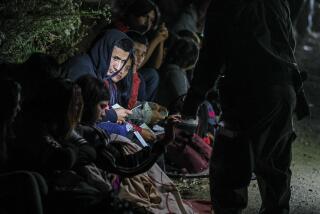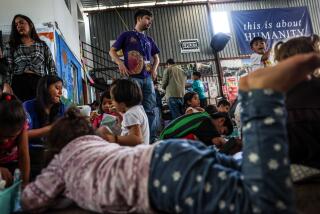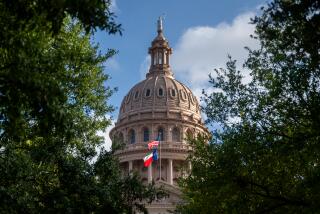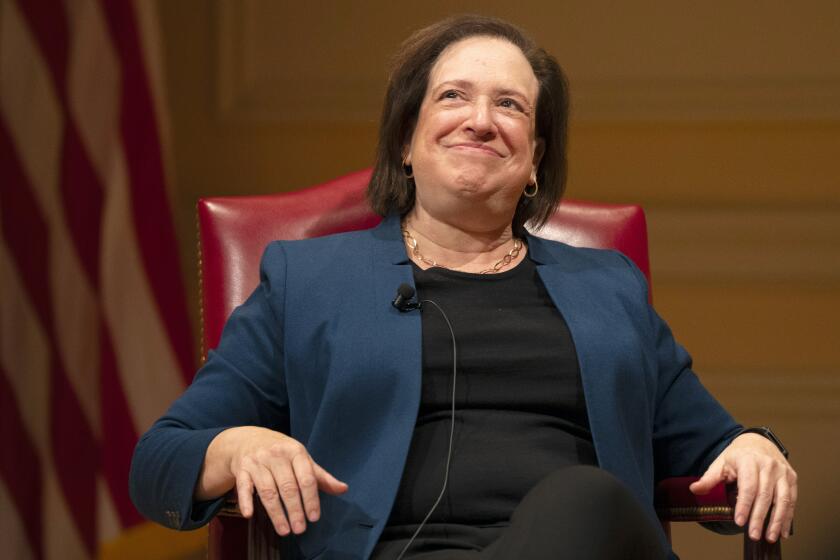A CITY IN CRISIS : Clinton: Parties Fail to Attack Race Divisions : Politics: The Democratic presidential candidate will visit Los Angeles to talk about the crisis with community leaders and civic officials.
In a stern, lectern-pounding address, Arkansas Gov. Bill Clinton on Saturday accused both parties of failing to confront racial divisions that have led to the creation of “a permanent underclass in America.”
Clinton warned that the violence that ripped through Los Angeles and other cities this week following the verdict in the Rodney G. King trial illuminates the wider risks in the breakdown of economic opportunity and cultural institutions among the inner-city poor.
“Thomas Jefferson once said that the crisis of slavery is a fire bell in the night,” Clinton declared before a gathering of the Democratic Leadership Council here. “The crisis in Los Angeles is now our fire bell in the night.”
After the speech, Clinton said that he would fly to Los Angeles tonight for a series of meetings through Monday afternoon with Latino, black and Korean community leaders and elected officials.
“I hope to hammer out some more concrete ideas about what we can all do,” Clinton said. “I think that it is very important that we use this crisis to have some long-term change.”
In Saturday’s speech, Clinton sought to offer a long-range vision of racial reconciliation that his aides believe was lacking from President Bush’s speech Friday night.
Clinton praised Bush’s remarks. But in sharp contrast with Bush, Clinton called for new government initiatives to assist distressed minority communities. At the same time, Clinton placed much less emphasis on such programs and stressed instead the importance of confronting racism among whites and rebuilding cultural values in inner-cities that he said have become “the other America.”
“People . . . are looting because they are not part of the system at all anymore,” Clinton said. “They do not share our values, and their children are growing up in a culture alien from ours, without family, without neighborhood, without church, without support.”
Both parties have failed to confront this challenge, Clinton argued. He accused the Republican Party of exploiting racial division for political gain, but he also chastised Democrats for not forthrightly facing issues such as crime and welfare that are infused with undercurrents of racial tension.
Clinton said the GOP had attempted to inflame white anxieties about welfare and affirmative action “to cover up for their senseless economic strategy that is driving income down for most American families.” But, he said, Democrats had left too many voters convinced they lacked sufficient concern about crime, were unwilling to re-examine social programs, “whether they work or not,” and viewed those advocating welfare reform “as the enemies of the poor.”
With both parties unwilling to candidly address these issues, Clinton said, “we have had too often a leadership in the nation’s capital paralyzed and divided: mirroring a country all too divided.”
As he has throughout the campaign--particularly in recent days--Clinton tried to chart a new path out of the impasse. In his speech, he earnestly appealed for racial reconciliation, saying too many whites had fled to the suburbs and now live in “isolation” from minorities. And he called for greater government spending on preschool education, health care, child care, and other programs aimed at expanding opportunity.
But, reaffirming a core message of his campaign, he insisted that such programs must simultaneously demand greater responsibility if they are to succeed.
Toward that end, Clinton called for tougher child support collection, welfare reform and a national service program that would allow young people to borrow money for higher education in return for two years of work as a police officer, teacher or community health worker.
And he urged both heightened volunteer efforts to reach troubled inner-city youths and tougher law enforcement.
As President, Clinton said, “I would start with the elemental proposition that the people in the other America deserve the same law and order the rest of us demand, and I would work to make the streets safer.”
After the speech, Clinton said his warning about the development of “the other America” consciously echoed the famous portrait of an America drifting into “two societies, separate and unequal” drawn by the federal Kerner Commission formed in the wake of urban riots during the 1960s.
But he acknowledged that his stress on the breakdown of inner-city institutions, as opposed to government inaction and white racism, vividly departed from the Kerner report--a seminal statement of liberal views on race.
Clinton said the development “of this massive group of the permanent underclass--people who live in a different culture”--had rendered obsolete the Kerner-era Democratic vision that urban problems could be attacked primarily through top-down government initiatives. Instead, he said, both government investments and grass-roots efforts would be required to improve the condition of the inner-city poor.
Clinton’s trip to Los Angeles will include an appearance at the First AME Church on Sunday night; on Monday, he will tour Korean neighborhoods with City Councilman Mike Woo, meet with Rep. Maxine Waters (D-Los Angeles)--a supporter whose district sustained among the most damage in the riots--and talk with community groups in East and South Los Angeles.
More to Read
Get the L.A. Times Politics newsletter
Deeply reported insights into legislation, politics and policy from Sacramento, Washington and beyond. In your inbox three times per week.
You may occasionally receive promotional content from the Los Angeles Times.






